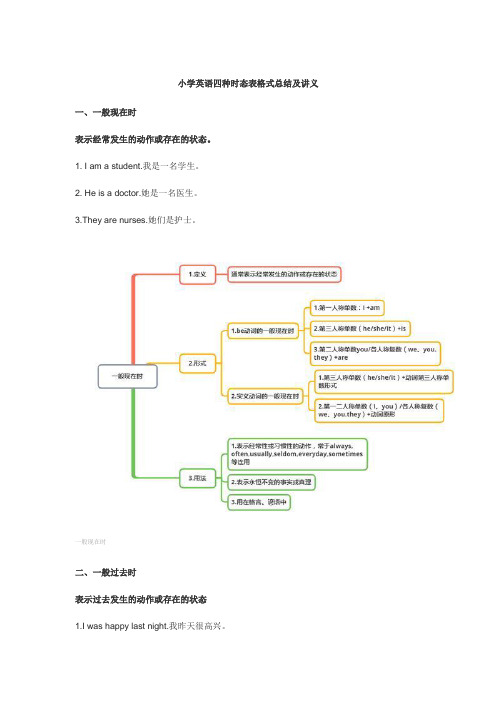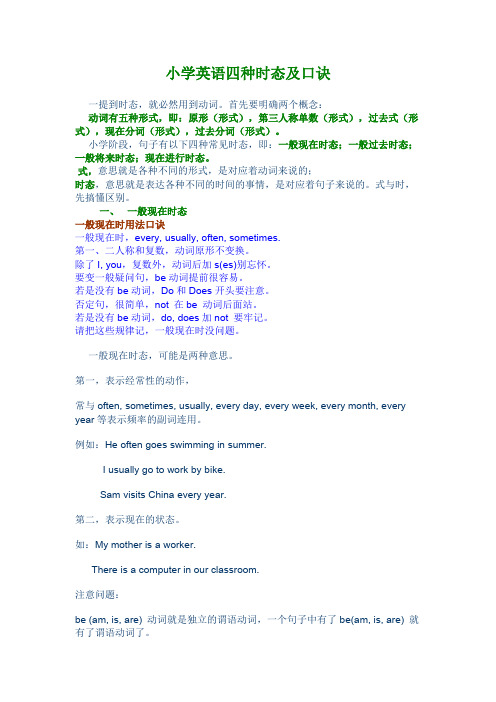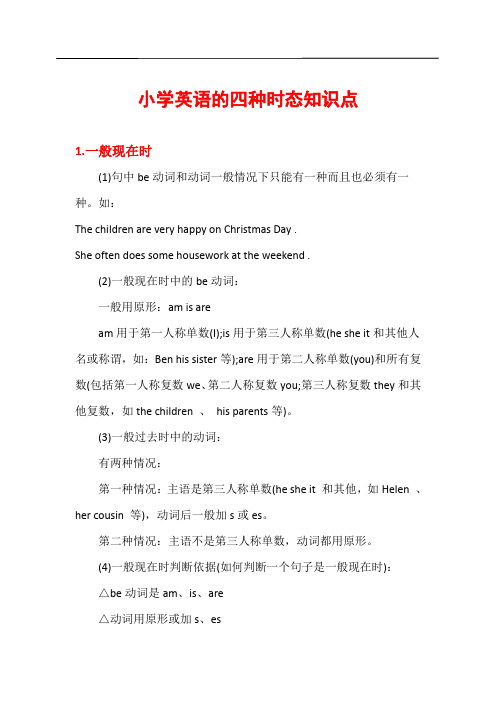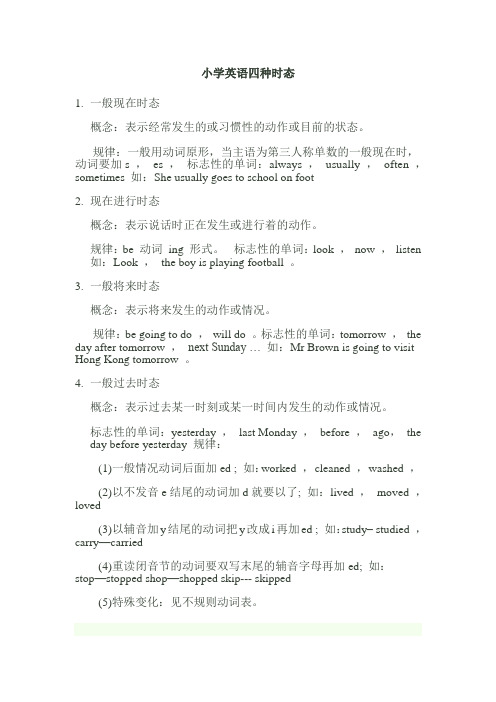小学英语四种时态
小学英语四种时态总结

小学英语四种时态总结英语语法中的时态是非常重要的一部分,正确使用时态可以使语言表达更加准确和清晰。
在小学英语学习阶段,学生们需要掌握四种基本的时态,它们分别是一般现在时、一般过去时、一般将来时和现在进行时。
下面将对这四种时态进行总结和归纳,希望能够帮助学生们更好地理解和掌握这些时态的用法。
一、一般现在时。
一般现在时表示的是经常性或习惯性的动作,或者是客观事实。
在句子中,一般现在时的动词形式不随主语的变化而变化,即动词用原形。
例如:1. I play football every Sunday.(我每个星期天都踢足球。
)。
2. She likes singing.(她喜欢唱歌。
)。
3. The sun rises in the east.(太阳从东方升起。
)。
二、一般过去时。
一般过去时表示的是发生在过去的动作或状态。
在句子中,一般过去时的动词形式通常是动词的过去式。
例如:1. I watched a movie last night.(昨晚我看了一部电影。
)。
2. They played basketball yesterday.(他们昨天打篮球。
)。
3. She lived in London for ten years.(她在伦敦住了十年。
)。
三、一般将来时。
一般将来时表示将来某个时间要发生的动作或状态。
在句子中,一般将来时通常使用助动词“will”或“shall”加上动词的原形。
例如:1. I will go to the park tomorrow.(我明天要去公园。
)。
2. She shall visit her grandparents next week.(她下周要去看望她的祖父母。
)。
3. We will have a party on Friday.(我们星期五要举办派对。
)。
四、现在进行时。
现在进行时表示现在正在进行的动作,或者是现阶段正在发生的动作。
在句子中,现在进行时的动词形式是“be”动词的现在分词形式。
小学英语常见四种时态

小学英语常见四种时态一、一般现在时:动词+S1.特殊情况:(1)sh 、ch、o结尾的+es例如:wash_(wash es) watch_(watch es) do_(do es)(2)(2)以y结尾的:把y变成i +es例如:study——(stud ies)2.用单词的正确形式填空:1)Mike does (do) his homework every day.2)My grandma watches (watch)TV every day.3)I often listen (listen)to the misic in the evening.二、现在进行时:动词+ing1.特殊情况:(1)以e结尾,去掉e,+ing例如:make(making) come(coming) dance(dancing)(2)双写结尾字母:sit(si tt ing)swim(swi mm ing) run(ru nn ing)2.用单词的正确形式填空:(1)look! li hua and Mike are singing(sing) now.(2)The small bear is climbing(climb)the tree.(3)My brother is making(make) kites.(4)Lily is sitting (sit) on the chair.三、一般过去时:动词+ed1.特殊情况:(1)有e结尾的,直接+ d例如:like(liked) live(lived)(2)有y结尾的,把y变成+ed 例如:cry(cried)study(studied)(3)不规则变化eat(ate) get(got) see(saw) spend(spent) do(did) teach(taught) win(won) write(wrote) buy (bought) swim(swam)go(went) meet(met) are(were) is(was) am(was)2.用单词的正确形式填空:(1).Did you water the flower yesterday.(2)L i Hua went(go) for a walk last Sunday.(3)M ike didn’t finish (finish)his homework yesterday.(4)I picked apples on the tree last month.四、一般将来时:(1)Shall/will +动词原形(shall只能用于第一人称I /we shall)(2)be going to +动词原形(表示打算做什么)be going to+地点(表示准备去)例如:1.I am going to see a film tomrrow.2There will be a party in our school3.Mike will visit his grandpa next week.。
小学英语四种时态表格式总结及讲义

小学英语四种时态表格式总结及讲义一、一般现在时表示经常发生的动作或存在的状态。
1. I am a student.我是一名学生。
2. He is a doctor.她是一名医生。
3.They are nurses.她们是护士。
一般现在时二、一般过去时表示过去发生的动作或存在的状态1.I was happy last night.我昨天很高兴。
2.You were great in the exam.你考试考得不错。
3.We met a girl at the gate.在门口我们见到了一个女孩。
一般过去式时三、一般将来时通常表示现在还有发生,但即将发生的事情或动作。
1.I shall be there in 5 minutes.我五分钟后会到那里。
2.We will go to the park this night.我们今天晚上将去公园。
3.Ken is gonging to have a bath.Ken要去洗澡了。
一般将来时四、现在进行时表示正在进行或发生的动作1.I am eating now.我正在吃东西。
2.He is singing now.他正在唱歌。
3.They are playing now.他们正在玩。
4.We are writing a book this month.我们这个月正在写一本书。
现在进行时以上是小学阶段常见的四大时态,除了以上在使用时还需注意以下几点:1. I am=I'm he is=he's she is=she's it is=it's we are=we're you are=you'reI shall/I will=I'll you will=you'll she will=she'll it will=it'll2.表示将来时时只有第一人称(I/we)后面接shall,表示我(们)将要……,3.当征求某人意见时一般使用shall I/shall we。
(完整版)小学英语四种时态及口诀

小学英语四种时态及口诀一提到时态,就必然用到动词。
首先要明确两个概念:动词有五种形式,即:原形(形式),第三人称单数(形式),过去式(形式),现在分词(形式),过去分词(形式)。
小学阶段,句子有以下四种常见时态,即:一般现在时态;一般过去时态;一般将来时态;现在进行时态。
式,意思就是各种不同的形式,是对应着动词来说的;时态,意思就是表达各种不同的时间的事情,是对应着句子来说的。
式与时,先搞懂区别。
一、一般现在时态一般现在时用法口诀一般现在时,every, usually, often, sometimes.第一、二人称和复数,动词原形不变换。
除了I, you,复数外,动词后加s(es)别忘怀。
要变一般疑问句,be动词提前很容易。
若是没有be动词,Do和Does开头要注意。
否定句,很简单,not 在be 动词后面站。
若是没有be动词,do, does加not 要牢记。
请把这些规律记,一般现在时没问题。
一般现在时态,可能是两种意思。
第一,表示经常性的动作,常与often, sometimes, usually, every day, every week, every month, every year等表示频率的副词连用。
例如:He often goes swimming in summer.I usually go to work by bike.Sam visits China every year.第二,表示现在的状态。
如:My mother is a worker.There is a computer in our classroom.注意问题:be (am, is, are) 动词就是独立的谓语动词,一个句子中有了be(am, is, are) 就有了谓语动词了。
句子中不能同时出现两个谓语动词。
不少同学经常出这样的错误:The boy is often eats hamburgers.(错)应改为:The boy often eats hamburgers.二、现在进行时态正在进行时态口诀现在分词用途多,进行时态不用说。
小学英语四种时态整理

动词变化规则
Be动词口诀:我用am你用are,is连着 她他它,单数is复数are,要想学好牢 记他。变否定更容易。be后not莫忘 记,变疑问,往前提,句尾问好莫丢弃 。什么问什么答,你问我答
动词+s的变化规则(动词三单)
1.直接加s,
如:cook-cooks, milk-milks
2.以s. x. sh. ch. o结尾 ,
妖镜,后面动词现原形)
be + doing
一般疑问句:Be提前 变否定就:Be 后+not is not= isn't are not=aren't I am not =I'm not
be 动词: Be(was/were)+其他
was/were is/am-was are-were was not=wasn't were not=weren't
陈述句: We will go to Beijing tomorrow. 否定句: We won't go to Beijing tomorrow. 一般疑问句及其答语: Will you go to Beijing tomorrow ? Yes,she will../No,she won't.
be找助动词。
一般疑问句:Do 在前 非三单,动词为原形 Do+主语+动词原形+其它 ?
变否定就:动词前+don't
实义动词: 主语+实义动词(+其 它)
实义动词: 主语+实义动词(+其 它)
一般疑问句:Does在前
主语为第三人称单数 (he, she,it)时,要 在动词后加"-s"或"es"。
小学英语的四种时态知识点

小学英语的四种时态知识点1.一般现在时(1)句中be动词和动词一般情况下只能有一种而且也必须有一种。
如:The children are very happy on Christmas Day .She often does some housework at the weekend .(2)一般现在时中的be动词:一般用原形:am is aream用于第一人称单数(I);is用于第三人称单数(he she it和其他人名或称谓,如:Ben his sister等);are用于第二人称单数(you)和所有复数(包括第一人称复数we、第二人称复数you;第三人称复数they和其他复数,如the children 、his parents等)。
(3)一般过去时中的动词:有两种情况:第一种情况:主语是第三人称单数(he she it 和其他,如Helen 、her cousin 等),动词后一般加s或es。
第二种情况:主语不是第三人称单数,动词都用原形。
(4)一般现在时判断依据(如何判断一个句子是一般现在时):△be动词是am、is、are△动词用原形或加s、es△没有时间状语或有usually、often、everyday、sometimes等不是具体的时间(5)有用的的依据:Be动词是is、am ←→名词用原形(这里包括可数名词的单数和不可数名词)Be动词是are ←→名词加s或es动词加s或es ←→主语是第三人称单数动词用原形←→主语不是第三人称单数(6)情态动词:我们现在学过的情态动词有:can、must、should、would。
情态动词后动词总是用原形。
(不受其他任何条件影响)2.一般过去时(1)句中be动词和动词一般情况下只能有一种而且也必须有一种。
如:The girls were on the grass just now .They visited my parents last weekend .(2)一般过去时中的be动词:一般用过去式:was werewas用于第一人称单数(I)和第三人称单数(he she it和其他人名或称谓,如:Ben 、his sister等);were用于第二人称单数(you)和所有复数(包括第一人称复数we、第二人称复数you;第三人称复数they 和其他复数,如the children 、his parents等)。
小学四种英语时态的归纳总结

千里之行,始于足下。
小学四种英语时态的归纳总结小学英语时态的归纳总结在小学阶段学习英语,掌握四种基本的时态是非常重要的。
这四种时态分别是一般现在时、一般过去时、一般将来时和现在进行时。
以下是对这四种时态的归纳总结。
一、一般现在时(Simple Present Tense)1. 表示经常性的动作或状态。
例如:I play basketball every Saturday.2. 在陈述句中,主语和动词要一致。
例如:He likes to watch movies.3. 在否定句中,用do / does + not + 动词原形。
例如:She does not like vegetables.4. 在疑问句中,用do / does + 主语 + 动词原形?例如:Do you have any pets?5. 用于表示客观事实、经验等。
二、一般过去时(Simple Past Tense)1. 表示过去发生的动作或状态。
例如:I watched a movie yesterday.2. 在陈述句中,动词过去式的变化规则是直接加-ed。
例如:We played soccer last week.3. 在否定句中,用did + not + 动词原形。
例如:She did not go to school yesterday.4. 在疑问句中,用did + 主语 + 动词原形?例如:Did you finishyour homework?第1页/共3页锲而不舍,金石可镂。
三、一般将来时(Simple Future Tense)1. 表示将来发生的动作或状态。
例如:I will go to the park tomorrow.2. 在陈述句中,用will / shall + 动词原形。
例如:She will visither grandparents next week.3. 在否定句中,用will not / won't + 动词原形。
小学英语四种时态

小学英语四种时态1.一般现在时态概念:表示经常发生的或习惯性的动作或目前的状态。
规律:一般用动词原形,当主语为第三人称单数的一般现在时,动词要加s ,es ,标志性的单词:always ,usually ,often ,sometimes 如:She usually goes to school on foot2.现在进行时态概念:表示说话时正在发生或进行着的动作。
规律:be 动词ing 形式。
标志性的单词:look ,now ,listen 如:Look ,the boy is playing football 。
3.一般将来时态概念:表示将来发生的动作或情况。
规律:be going to do ,will do 。
标志性的单词:tomorrow ,the day after tomorrow ,next Sunday … 如:Mr Brown is going to visit Hong Kong tomorrow 。
4.一般过去时态概念:表示过去某一时刻或某一时间内发生的动作或情况。
标志性的单词:yesterday ,last Monday ,before ,ago,the day before yesterday 规律:(1)一般情况动词后面加ed ; 如:worked ,cleaned ,washed ,(2)以不发音e结尾的动词加d就要以了; 如:lived ,moved ,loved(3)以辅音加y结尾的动词把y改成i再加ed ; 如:study– studied ,carry—carried(4)重读闭音节的动词要双写末尾的辅音字母再加ed; 如:stop—stopped shop—shopped skip--- skipped(5)特殊变化:见不规则动词表。
小学英语固定搭配Good night 晚安.in the morning 在早上at noon 在中午in the afternoon 在下午in the evening 在傍晚at night 在夜间have/eat breakfast 吃早饭have/eat lunch 吃午饭have/eat supper(dinner) 吃晚饭read a book 读书sing a song 唱歌have a meeting 开会have class 上课have a party 聚会have a competition 竞赛have a sleep 睡觉have a snack 吃零食have a picnic 野餐have a buffet dinner 吃自助餐draw pictures 画画listen to music 听音乐listen to the radio 听收音机learn English 学习英语learn Chinese 学习语文Learn math 学习数学tell stories 讲故事take a walk 散步ask and answer questions 问答问题fly a kite 放风筝ride a bike 骑自行车ride a horse 骑马play computer games 玩电脑游戏play games 做游戏play hide and seek 玩捉迷藏do homework 做作业watch TV 看电视take a shower 洗淋浴take a bath 洗澡open the door 开门open the window 开窗户close the door 关门close the window 关窗户paly football 踢足球/打橄榄球play basketball 打篮球play volleyball 打排球play badminton 打羽毛球play golf 打高尔夫球play bowling 打保龄球play table tennis 打乒乓球play baseball 打棒球play tennis 打网球play soccer 踢足球play hockey 打曲棍球play chess 下棋go fishing 去钓鱼go swimming 去游泳go shopping 去购物go skating 去滑冰go bike-riding/ go cycling 去骑自行车go sking 去滑雪go camping 去野营listen to the news 听新闻read the newspaper 看报read the magazine 看杂志go to school 去上学go home 回家go to the park 去公园go to the zoo 去动物园go to the library 去图书馆go to the hospital 去医院go to the cinema 去电影院go to see a film /movie去看电影get up 起床go to bed 上床go to sleep 去睡觉brush the teeth 刷牙wash the hands 洗手wash the face 洗脸wash clothes 洗衣服air the room 给房间通风make the bed 铺床sweep the floor 扫地mop the floor 拖地clean the room 打扫房间climb the trees 爬树climb the mountains 爬山cook the meals 做饭drink milk/juice/coca cola 喝牛奶/果汁/可乐play the piano 弹钢琴play the violin 拉小提琴play the drum 打鼓play the guitar 弹吉他play the xylophone 弹木琴play the flute 吹笛子play the harp 弹竖琴play the erhu 拉二胡play the zither 弹古筝play the banjo 弹班卓play the trumpet 吹小号stay at home 呆在家里at home 在家at school 在学校at church 在教堂make a cake 做蛋糕take pictures/photos 照相comb hair 梳头发have a haircut 理发go away 走开at the weekend 在周末stand up 起立sit down 坐下New year 元旦Spring Festival 春节Lantern Festival 元宵节Spring Cleaning Day 清明节Dragon Boat Festival 龙舟节International labour day 国际劳动节Trees planting day 植树节Children's day 儿童节Party's day 党的生日Army's day 建军节Teacher's day 教师节National day 国庆节Thanksgiving day 感恩节Chrismas day 圣诞节in the morning 在早上at noon 在中午in the afternoon 在下午in the evening 在傍晚at night 在夜间have/eat breakfast 吃早饭have/eat lunch 吃午饭have/eat supper(dinner) 吃晚饭read a book 读书sing a song 唱歌have a meeting 开会have class 上课have a party 聚会have a competition 竞赛have a sleep 睡觉have a snack 吃零食have a picnic 野餐have a buffet dinner 吃自助餐draw pictures 画画listen to music 听音乐listen to the radio 听收音机learn English 学习英语learn Chinese 学习语文Learn math 学习数学tell stories 讲故事take a walk 散步ask and answer questions 问答问题fly a kite 放风筝ride a bike 骑自行车ride a horse 骑马play computer games 玩电脑游戏play games 做游戏play hide and seek 玩捉迷藏do homework 做作业watch TV 看电视take a shower 洗淋浴take a bath 洗澡open the door 开门open the window 开窗户close the door 关门close the window 关窗户paly football 踢足球/打橄榄球play basketball 打篮球play volleyball 打排球play badminton 打羽毛球play golf 打高尔夫球play bowling 打保龄球play table tennis 打乒乓球play baseball 打棒球play tennis 打网球play soccer 踢足球play hockey 打曲棍球play chess 下棋go fishing 去钓鱼go swimming 去游泳go shopping 去购物go skating 去滑冰go bike-riding/ go cycling 去骑自行车go sking 去滑雪go camping 去野营listen to the news 听新闻read the newspaper 看报read the magazine 看杂志go to school 去上学go home 回家go to the park 去公园go to the zoo 去动物园go to the library 去图书馆go to the hospital 去医院go to the cinema 去电影院go to see a film /movie去看电影get up 起床go to bed 上床go to sleep 去睡觉brush the teeth 刷牙wash the hands 洗手wash the face 洗脸wash clothes 洗衣服air the room 给房间通风make the bed 铺床sweep the floor 扫地mop the floor 拖地clean the room 打扫房间climb the trees 爬树climb the mountains 爬山cook the meals 做饭drink milk/juice/coca cola 喝牛奶/果汁/可乐play the piano 弹钢琴play the violin 拉小提琴play the drum 打鼓play the guitar 弹吉他play the xylophone 弹木琴play the flute 吹笛子play the harp 弹竖琴play the erhu 拉二胡play the zither 弹古筝play the banjo 弹班卓play the trumpet 吹小号stay at home 呆在家里at home 在家at school 在学校at church 在教堂make a cake 做蛋糕take pictures/photos 照相comb hair 梳头发have a haircut 理发go away 走开at the weekend 在周末stand up 起立sit down 坐下New year 元旦Spring Festival 春节Lantern Festival 元宵节Spring Cleaning Day 清明节Dragon Boat Festival 龙舟节International labour day 国际劳动节Trees planting day 植树节Children's day 儿童节Party's day 党的生日Army's day 建军节Teacher's day 教师节National day 国庆节小学英语动词过去式agree 同意agreedask 问askedanswer 回答answeredbecome 成为becamebegin 开始beganbring 带来broughtbuy 买boughtcall 呼叫calledcarry 搬运carriedcatch 抓住caughtcheck 检查checkedclean 清洁cleanedclimb 爬climbedcome 来camecook 煮cookedcut 切cutdance 跳舞danceddo 做diddraw 画drewdrink 喝drankdrive 驾驶droveeat 吃ateenjoy 欣赏enjoyedfeel 感觉feltfly 飞fliedforget 忘记forgotfish 钓鱼fishedget 得到gotgive 给gavego 去wentgrow 成长grewhave 有hadhear 听到heardhelp 帮助helpedjump 跳jumpedkeep 保存keptknow 知道knewlearn 学习learned listen 听listenedlike 喜欢likedlook 看lookedlive 生活livedlove 喜爱lovedmake 做mademeet 遇见metmove 移动moved need 需要needed open 打开opened paint 画paintedpick 摘pickedplay 玩playedplan 计划planned practise 练习practised prefer 更喜欢preferred put 放putread 读readride 骑roderun 跑ransay 说saidsee 看sawsit 坐satskip 跳skippedspeak 说spokestart 开始startedstay 停留stayed sweep 扫sweptstudy 学习studied swim 游泳swamtalk 谈话talkedtake 带去tookteach 教taughtthank 谢谢thanked tell 告诉toldthink 想thought travel 旅游traveledtry 试trieduse 使用used wake 醒来woke walk 走路walked want 想wanted wash 洗washed watch 看watched water 浇水watered wave 挥动waved work 工作worked worry 担心worried write 写wrote小学英语可数名词复数形式1)以y结尾的专有名词,或元音字母+y 结尾的名词变复数时,直接加s变复数。
- 1、下载文档前请自行甄别文档内容的完整性,平台不提供额外的编辑、内容补充、找答案等附加服务。
- 2、"仅部分预览"的文档,不可在线预览部分如存在完整性等问题,可反馈申请退款(可完整预览的文档不适用该条件!)。
- 3、如文档侵犯您的权益,请联系客服反馈,我们会尽快为您处理(人工客服工作时间:9:00-18:30)。
英语四种时态◆一般现在时1.定义:1.表示目前存在的状态2.表示经常性、习惯性的动作3.表示客观的事实2.标志词:频度副词:例:always, usually, often, sometimes, every day(week….)例如:1. I often watch TV at home.3.结构:当主语是第三人称单数时动词+ s, 或es)2. She always goes to school on foot 疑问形式:.主语前加do 或does (动词还原)否定式:动词前加don’t 或doesn’t (动词还原)例如:Do you clean your room on the weekend? Does she wash her clothes on the weekend?ea◆现在进行时1. 定义:表示目前正在发生的动作或存在的状态2.标志词:1.提示语:look! Listen! now!等词3.结构:Be动词(am, is, are ) + 动词ing例如:1. Look, they are playing football.2. Listen ,she is singing. 3.I am reading now .◆一般将来时1.定义:1.表示计划或打算做某事 2.将要发生的动作或存在的状态2.标志词:1.tomorrow, the next day, this afternoon, this evening 2.next week (month, year…)3.结构有两种:1.be going to + 动词原形 2.will + 动词原形如:1.He is going to play football next week. 2 .He will play basketball next week.疑问形式:be 或will 放主语前如:1. Is he going to play football next week?2.Will he play baskball next week?否定式:be 或will 后加not will not = won’t如:1. He isn’t going to play football next week? 2. He won’t play baskball next week?◆一般过去式1.定义:表示过去时间内发生的动作或存在的状态2.标志词:1.yesterday, last week/ year/ month 等3.结构:1.动词用过去时was, were ,did, played 等。
例如:is/am---was are ----were 疑问形式:1.was / were 放主语前 2.主语前加did (动词还原)否定式:1.was/ were + not 2.动词前加didn’t (动词还原)该句型分布在第8册Unit3&4中。
如:1.What did you do last weekend? I played football.2. Did you help them clean their r oom? Yes, I did.3.What did you do yesterday? I went fishing.4. Did you read book? Yes, I did.5. Did you clean your room? No, I didn’t.6.Where did you go on your holiday? I went to Xinjiang.7. What did you do there? I sang and danced with my new friends.8. How did you go there?I went by train.◆小学英语六年级情态动词我们小学常见的情态动词有:1.can 过去式(could),表示某人或某物能做某事。
例如;I can cook the meals. She can clean the room.can的否定形式;直接在can的后面加not. 即can not/ can’t+ 动词原形。
2.may (might), may与can意思相近,表示可以,能。
例如;May I come in? 我可以进来吗?3.must, have to的用法,两个都表示“必须”。
must表示出于主观意识而必须要做have to 却表示由于某种客观原因。
例如:We must know the traffic rules.My bike was broken. I have to walk to school today.4.should 应该, will (would)。
5.情态动词无人称和数的变化;不能单独使用,必须与其后的动词原形构成谓语。
情态动词后面跟动词原形。
◆我们学过以下情况动词用原形;1.不定式to+动词原形2.can/may/must/could/shoud等情态动词+动词原形4.祈使句例如;D on’t open the door. 不要开门。
5.一般现在时,一般过去时,一般将来时的疑问句和否定句(do,does,diddon’t ,doesn’t ,didn’t)动词用回原形6.be going to/will +动词原形(一般将来时)7.let/make等使役动词+动词原形8.help sb do sth帮助某人做某事。
◆部分英语发音规则一,元音字母在重读音节中的读音元音字母的读音a 在开音节中读[ei]如:n a me pl a ne J a ne f a ce c a ke在闭音节中[æ]如:b a g d a d h a t m a p bl a ck b a cke 在开音节中[i:]h e th e se m e Chin e se在闭音节中[e]b e d l e t p e n d e sk y e s e ggi 在开音节中[ɑi]b i ke dr i ve t i me n i ce k i te在闭音节中[ı] f i sh b i g d ri nk s i t m i lk sw i mo 在开音节中[әu]th o se cl o se g o h o me n o在闭音节中[D] cl o ck n o t b o x sh o p s o cku 在开音节中[ju:] st u dent exc u se d u ty T u esday在闭音节中[Λ]b u s c u p j u mp m u ch l u nch在开音节中,元音字母u在辅音字母j, l ,r ,s后面时读[u:]音,例如:J u ne bl u e r u ler s u perPEP四年级下册四会单词词汇表Unit 1computer(计算机) board(写字板) fan(风扇) light(灯) this(这;这个) is(是) my(我的) that(那;那个) your(你的) teacher’s desk(讲台)picture(图画;照片) wall(墙壁) floor(地板) yes(是;是的) it(它)Unit 2one(一) two(二) three(三) four(四) five(五) six(六) seven(七) eight(八) nine(九)ten(十) what(什么) time(时间) it’s=it is …o’clock(…点钟) math(数学)Chinese(语文) English(英语) P.E.(体育) music(音乐) for(为;给) class(课程) Unit 3jacket(夹克衫) shirt(衬衫) skirt(裙子) dress(连衣裙) T-shirt(T恤衫)red(红色的) blue(蓝色的) yellow(黄色的) green(绿色的) white(白色的)no(不;不是) not(不;不是的) colour(颜色)Unit 4warm(暖和的) cold(寒冷的) cool(凉爽的) today(今天) jeans(牛仔裤)pants(长裤) socks(袜子) shoes(鞋子) let’s=let us play(玩;踢)football(足球) snowy(下雪的) sunny(晴朗的)Unit 5how much(多少钱) big(大的) small(小的) long(长的) short(短的) apple(苹果)banana(香蕉) pear(梨) orange(橙子) watermelon(西瓜)are(是)they 它(他、她)们Unit 6horse(马) aren’t=are not cat(猫) rabbit(兔子) pig(猪) d uck(鸭子)dog(狗) eleven(十一) twelve(十二) thirteen(十三) fifteen(十五)twenty(二十) how many(多少) there(那儿;那里)PEP五年级上册四会单词词汇表Unit 1Young (年轻的) funny (滑稽可笑的) tall (高的) strong (强壮的)kind (和蔼的、亲切的 old (年老的) short (矮的) thin (瘦的) Mr (先生)like (像、喜欢) strict (严格的) smart (聪明的、巧妙的) active (积极的、活跃的) quiet (安静的、文静的) very (很、非常) but (但是)Unit 2Mondy (星期一) Tuesday (星期二) Wednesday (星期三) Thursday (星期四)Friday (星期五) Saturday (星期六) Sunday (星期天) day (天)have (有、吃) on (在…..时候) do homework (做作业)watch TV (看电视) read books (读书)Unit 3eggplant (茄子) fish (鱼) green beans (青豆) tofu (豆腐)potato (土豆) tomato (西红柿) for (为) lunch (中餐) we (我们)tasty (好吃的) sweet (甜的) sour (酸的) fresh (新鲜的) salty (咸的)favourite (最喜欢的) they are (他们是) fruit (水果) grape (葡萄)Unit 4cook the meals (倒垃圾) water the flowers (浇花) sweep the floor (扫地)clean the bedroom (打扫卧室) make the bed (铺床) set the table (摆饭桌)wash the clothes (洗碗碟) do the dishes (收拾衣服) use a computer (使用计算机Unit 5curtain (空调) trash bin (垃圾箱) closet (壁橱) mirror (镜子)end table (床头柜) bedroom (卧室) kitchen (厨房) bathroom (卫生间)living room (客厅) in (在…里面) on (在…上面) under (在…下面)near (在..旁边) behind (在…后边) clothes (衣服)Unit 6river (河流) flower (花) grass (草) lake (湖泊) forest (森林)path (路) pake (公园) picture (照片) hourse (房子) bridge (桥) tree (树) road (公路) building (建筑物) clean (干净的)PEP五年级下册四会单词词汇表Unit 1do morning exercises(晨练) eat breakfast(吃早饭) have english class(上英语课) play sports(进行体育运动) eat dinner(吃晚饭) when(什么时候)evening(夜晚;晚上) get up(起床) at(在……点钟) usually(通常;一般) noon(中午) climb mountains(爬山) go shopping(购物;买东西) play the piano (弹钢琴) visit grandparents(看望祖父母) go hiking(去远足)weekend(周末) often(经常) sometimes(有时候)Unit 2spring(春天) summer(夏天) fall(秋天) winter(冬天) season季节)which(哪一个) best(最;极) swim(游泳) fly kites(放风筝) skate(滑冰;滑冰鞋) make a snowman(堆雪人) plant trees(种树) why(为什么)because(因为) sleep(睡觉)Unit 3Jan./January(一月) Feb./February(二月) Mar./March(三月) Apr./April(四月) May(五月) June(六月) July(七月) Aug./Augest(八月) Sept./September (九月) Oct./October(十月) Nov./November(十一月) Dec./December(十二月)birthday(生日) uncle(叔叔;舅舅) her(她的) date(日期)Unit 4draw pictures(画画)cook dinner(做饭) read a book(看书answer the phone (接电话)listen to music9(听音乐) clean the room(打扫房间) write a letter (写信)write an e-mail(写电子邮件) mom(妈妈)grandpa(爷爷;外公)study(书房)Unit 5fly(飞) jump(跳) walk(走) run(跑) swim(游泳) kangaroo(袋鼠) sleep (睡觉) climb(往上爬) fight(打架) swing(荡;荡秋千) drink water(喝水)Unit 6take pictures(照相) watch insects(观察昆虫) pick up leaves(采摘树叶) do an experiment(做实验) catch butterfly(捉蝴蝶) honey(蜂蜜) count insects (数昆虫) collect leaves(收集树叶) wtite a report(写报告) play chess(下棋) have a picnic(举行野餐)PEP六年级上册四会单词词汇表Unit 1by (经,乘) foot(脚) bike(自行车) bus(公共汽车) train(火车) how(怎样)go to school(上学) traffic(交通) traffic light(交通灯) traffic rule (交通规则) stop(停,停车站)wait(等待) get to(到达)Unit 2library(图书馆) post office(邮局) hospital(医院) cinema(电影院) bookstore(书店) where(在哪里,到哪里) please(请) next to(与…相邻)turn(转弯) right (右边) left(左边) straight(成直线地) then (然后)Unit 3next week(下周) this morning(今天上午) this afternoon(今天下午) this evening (今天晚上) comic book(漫画书) post card(明信片) newspaper(报纸) buy(购买)Unit 4hobby(爱好) ride a bike--riding a bike(骑自行车) dive--diving(跳水) play the violin—playing the violin(拉小提琴) make kites—making kites(制作风筝) collect stamps—collecting stamps(集邮) live –lives(居住) teach--teaches(教) go--goes(去) watch--watches(看) read--reads(读,看) does doesn’t=does notUnit 5singer(歌唱家,歌手) writer(作家) actor(男演员) actress(女演员) artist(画家) TV reporter(电视台记者) engineer(工程师) accountant(会计) policeman(男警察) salesperson(销售员) cleaner(清洁工) where(在哪里,到哪里) work(工作)Unit 6rain(雨) cloud (云) sun(太阳) stream(河,溪) come from(来自,从…来) seed(种子) soil(土壤) sprout (苗,芽) plant(植物,种植) should (应该) then(然后)PEP六年级下册四会单词词汇表Unit 1tall—taller更高的short—shorter 更矮的strong—stronger 更强壮的old—older 年龄更大的young—younger 更年轻的big—bigger 更大的heavy—heavier 更重的long—longer 更长的thin—thinner 更瘦的small—smaller (体型)更小的Unit 2have a fever 发烧 have a sore throat喉咙疼 have a cold感冒 have a toothache 牙疼 have a headache 头疼 matter事情,麻烦 sore 疼的 hurt疼痛 nose 鼻子tired疲劳的,累的 excited兴奋的 angry生气的 happy高兴的 bored无聊的,烦人的 sad 忧伤的,悲伤的Unit 3watch—watched 看 wash—washed 洗 clean—cleaned打扫 play—played玩visit—visited 看望 do—did last weekend 上一个周末 go—went去 go to a park—went to a park 去公园 go swimming—went swimming去游泳 go fishing—went fishing去钓鱼 read—read 读 go hiking—went hiking 去郊游Unit 4leran Chinese—learned Chinese学汉语 sing and dance—sang and danced唱歌和跳舞 eat good food—ate good food吃好吃的食物 take pictures—took pictures 照相 climb—climbed 爬 have—had buy presents—bought presents买礼物 row a boat—rowed a boat 划船 see elephant—saw elephant 看大象 go skiing—went skiing 去滑雪 go ice-skating—went ice-skating 去滑冰how怎么,如何 get—got 到达 last 上一个的,仅余的,留在最后的第一章名词名词又分为可数名词和不可数名词第一节.可数名词可数名词有单数和复数两种形式。
